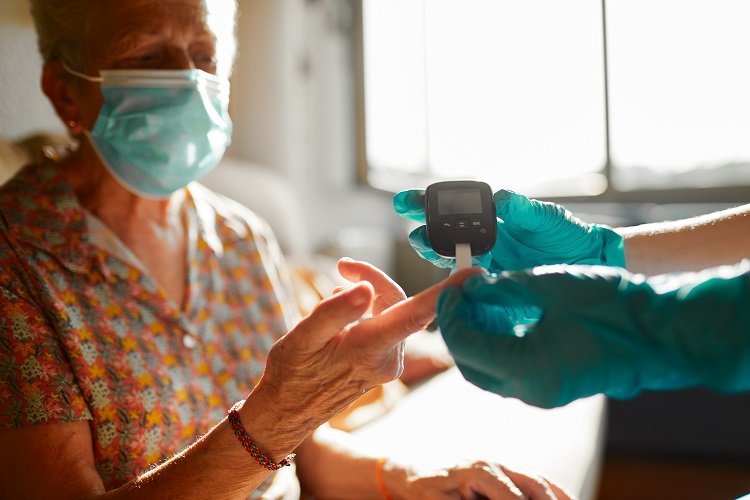The coexistence of multiple health conditions poses a unique set of challenges. One such intricate intersection is the correlation between diabetes and cancer. As individuals grapple with the complexities of managing these two conditions simultaneously, the need for comprehensive information and guidance becomes paramount. This blog aims to shed light on the intricate relationship between diabetes and cancer, exploring the impact of one condition on the other and providing insights into effective diabetes and cancer treatment strategies.
Contents
Why Do Cancer Patients Get Diabetes?
 Cancer patients may develop diabetes through various mechanisms, and the relationship between cancer and diabetes is bidirectional. While cancer itself doesn’t directly cause diabetes, certain factors associated with cancer and its treatment can contribute to the development of diabetes. Here are some reasons why cancer patients may be at an increased risk of developing diabetes:
Cancer patients may develop diabetes through various mechanisms, and the relationship between cancer and diabetes is bidirectional. While cancer itself doesn’t directly cause diabetes, certain factors associated with cancer and its treatment can contribute to the development of diabetes. Here are some reasons why cancer patients may be at an increased risk of developing diabetes:
- Insulin Resistance
Cancer, particularly certain types like pancreatic cancer, can lead to insulin resistance. Insulin resistance is a condition where the body’s cells become less responsive to insulin, making it difficult for glucose to enter cells. This can result in elevated blood sugar levels, a characteristic feature of diabetes.
- Cancer-Related Inflammation
Chronic inflammation is a common feature in many types of cancer. Inflammatory substances released by cancer cells and the body’s response to the cancer can contribute to insulin resistance and impaired glucose metabolism, increasing the risk of diabetes.
- Hormonal Changes
Some cancers can disrupt the normal hormonal balance in the body. For example, certain tumors may produce hormones or substances that interfere with insulin action. And, leading to changes in glucose regulation.
- Pancreatic Dysfunction
The pancreas plays a crucial role in insulin production. Cancers affecting the pancreas, such as pancreatic cancer, can impair the organ’s function, impacting insulin secretion and contributing to the development of diabetes.
- Genetic Predisposition
Genetic factors may play a role in both cancer and diabetes. Some individuals may have a genetic predisposition that makes them more susceptible to developing both conditions.
- Stress Response
The stress response triggered by cancer and its treatment can elevate cortisol levels. Chronic elevation of cortisol, known as hypercortisolism, can contribute to insulin resistance and diabetes.
It’s crucial to note that the relationship between cancer and diabetes is complex. And not all cancer patients will develop diabetes. The specific mechanisms may vary depending on the type of cancer, individual factors, and the stage of the disease.
What Are Some Effective Diabetes And Cancer Treatment?
 The treatment of diabetes and cancer is complex, and the approach varies based on the specific type and stage of each condition. When managing both diabetes and cancer concurrently, a multidisciplinary approach involving collaboration between oncologists, endocrinologists, and other healthcare professionals is crucial.
The treatment of diabetes and cancer is complex, and the approach varies based on the specific type and stage of each condition. When managing both diabetes and cancer concurrently, a multidisciplinary approach involving collaboration between oncologists, endocrinologists, and other healthcare professionals is crucial.
Here are some strategies and considerations for effective diabetes and cancer treatment options:
Individualized Treatment Plans
Tailoring treatment plans to the individual patient’s specific circumstances is essential when managing both diabetes and cancer concurrently. Factors such as the type and stage of cancer, the type of diabetes, and other relevant health considerations all play a role in determining the most effective and personalized approach to care.
Cancer Treatment Modalities
The choice of cancer treatment modalities, such as surgery, chemotherapy, radiation therapy, immunotherapy, or targeted therapy, depends on the specific type and stage of cancer. Healthcare professionals must carefully consider the impact of these treatments on blood glucose levels and collaborate to optimize both cancer and diabetes management strategies.
Diabetes Medications
Adapting diabetes medications is often necessary during cancer treatment. Certain cancer therapies, including steroids and specific chemotherapy drugs, can influence blood sugar levels, requiring adjustments to diabetes medication dosages. Regular communication between oncologists and endocrinologists is crucial for fine-tuning medication regimens.
Blood Sugar Monitoring
Regular monitoring of blood glucose levels is a cornerstone of managing diabetes during cancer treatment. Frequent checks enable timely adjustments to diabetes medications, ensuring that blood sugar levels remain within the target range. This proactive approach is vital for maintaining optimal diabetes control throughout the cancer journey.
Nutritional Support
Collaborating with dietitians to develop a nutrition plan that addresses the unique dietary needs of both diabetes and cancer patients is essential. Managing carbohydrate intake, ensuring adequate protein, and addressing specific nutritional requirements related to cancer treatment contribute to overall well-being and treatment success.
Physical Activity
Encouraging and supporting physical activity, to the extent possible, is crucial for individuals with both diabetes and cancer. Regular exercise not only contributes to better blood sugar control but also promotes overall well-being and may help mitigate some of the side effects associated with cancer treatment.
Stress Management
Implementing stress management techniques is vital, given the impact of stress on blood sugar levels and overall health. Mindfulness, relaxation exercises, and counseling can be valuable tools in helping patients cope with the emotional and psychological challenges associated with dual diagnoses.
Monitoring for Treatment-Related Side Effects
Vigilant monitoring for treatment-related side effects that may impact diabetes control is essential. Changes in appetite, nausea, fatigue, and other side effects should be promptly addressed to minimize their impact on both diabetes management and overall quality of life.
Collaborative Care Team
Establishing and maintaining close communication and collaboration between oncologists, endocrinologists, nurses, and other healthcare providers is critical. This ensures a comprehensive and integrated approach to care, addressing both the cancer and diabetes aspects of the patient’s health.
Research and Clinical Trials
Exploring opportunities for participation in clinical trials or research studies is important for individuals with dual diagnoses. Clinical trials may offer innovative treatments or provide insights into managing both conditions more effectively, and participation in such studies can contribute to advancing medical knowledge.
Education and Support
Providing education and support to patients and their families is crucial for empowering them in managing both diabetes and cancer. Information on lifestyle modifications, self-care practices, and addressing psychological aspects of coping with dual diagnoses helps individuals navigate the challenges associated with their health conditions. Regular communication with healthcare providers ensures that patients are well-informed and actively involved in their care journey.
It’s important to emphasize that the treatment approach will vary for each individual, and decisions should be made collaboratively with healthcare professionals. Clear follow-up appointments and adjustments to the treatment plan based on the patient’s response and evolving health status are essential components of managing diabetes and cancer concurrently.
What Are Some Challenges In Diabetes And Cancer Treatment?
 The simultaneous diabetes and cancer treatment presents a myriad of challenges for patients and healthcare professionals alike. These challenges stem from the intricate interplay between the two conditions and the potential impact of treatments on each other. Here are some key challenges in diabetes and cancer treatment:
The simultaneous diabetes and cancer treatment presents a myriad of challenges for patients and healthcare professionals alike. These challenges stem from the intricate interplay between the two conditions and the potential impact of treatments on each other. Here are some key challenges in diabetes and cancer treatment:
Bidirectional Impact
One of the fundamental challenges lies in the bidirectional impact between diabetes and cancer. Diabetes may increase the risk of certain cancers, and cancer, in turn, can affect glucose metabolism. Potentially leading to new-onset diabetes or exacerbating existing diabetes.
Insulin Resistance and Hyperglycemia
Cancer-related factors, such as inflammation and hormonal changes, can contribute to insulin resistance, leading to challenges in glucose control. Hyperglycemia, or high blood sugar levels, is a common concern that requires careful management, especially during cancer treatments that may exacerbate this condition.
Nutritional Challenges
Balancing nutritional needs for both diabetes and cancer poses a challenge. Cancer treatments can affect appetite, taste, and digestion, making it challenging for individuals to maintain a healthy diet. Coordinating dietary recommendations to meet the specific requirements of both conditions is essential.
Medication Interactions
Managing medications for both diabetes and cancer presents complexities. Some cancer treatments may interact with diabetes medications, influencing their effectiveness or causing additional side effects. Close coordination between oncologists and endocrinologists is crucial for optimizing medication regimens.
Psychosocial Impact
Dealing with dual diagnoses can have significant psychosocial implications. The emotional burden, stress, and anxiety associated with cancer diagnosis and treatment may impact diabetes management. Conversely, the challenges of managing diabetes may add an extra layer of stress for cancer patients.
Increased Healthcare Utilization
Patients with both diabetes and cancer often require more frequent healthcare visits and monitoring. Coordinating care between different specialists, managing appointments, and addressing the diverse needs of both conditions contribute to increased healthcare utilization.
Risk of Infections
Cancer treatments, particularly those that suppress the immune system, can increase the risk of infections. Individuals with diabetes already have a heightened susceptibility to infections, and the combination of both conditions may necessitate careful monitoring and preventive measures.
Financial Burden
Managing two chronic conditions concurrently can lead to increased healthcare costs, including medications, treatments, and additional consultations. This financial burden can be a significant stressor for individuals and may impact their ability to access necessary care.
Addressing these challenges requires a collaborative and multidisciplinary approach, involving open communication between healthcare professionals and patients.
Does Diabetes Make Cancer Worse?
 The relationship between diabetes and cancer is complex. And while diabetes itself may not directly cause cancer, it can potentially contribute to the progression and severity of certain cancers. In individuals with diabetes, particularly those with insulin resistance, elevated insulin levels may create an environment that supports the growth and proliferation of cancer cells. The compromised immune function in individuals with diabetes may also impact the body’s ability to combat cancer cells effectively.
The relationship between diabetes and cancer is complex. And while diabetes itself may not directly cause cancer, it can potentially contribute to the progression and severity of certain cancers. In individuals with diabetes, particularly those with insulin resistance, elevated insulin levels may create an environment that supports the growth and proliferation of cancer cells. The compromised immune function in individuals with diabetes may also impact the body’s ability to combat cancer cells effectively.
Moreover, diabetes can complicate cancer treatment. High blood sugar levels, common in diabetes, can influence treatment outcomes and increase the risk of complications during therapies like chemotherapy or radiation. Cancer patients with diabetes may experience challenges in maintaining stable blood glucose levels during treatment, potentially impacting their overall well-being. Therefore, the presence of diabetes in cancer patients requires careful consideration and management to optimize both cancer treatment effectiveness and diabetes control.
Conclusion
In navigating the intricate relationship between diabetes and cancer, it becomes clear that a comprehensive and collaborative approach is essential for effective management. The bidirectional impact of these conditions, influenced by factors like insulin resistance and chronic inflammation, underscores the need for tailored treatment plans. Addressing challenges such as nutritional complexities, medication interactions, and psychosocial impacts is crucial.
By embracing a multidisciplinary care team, patients can receive personalized support that integrates both diabetes and cancer treatment. Do you want to get rid of diabetes? Join our online diabetes treatment program and reverse Diabetes naturally through lifestyle changes such as a Personalized Diet plan, Exercise, Yoga, dieticians, and health coaches.

